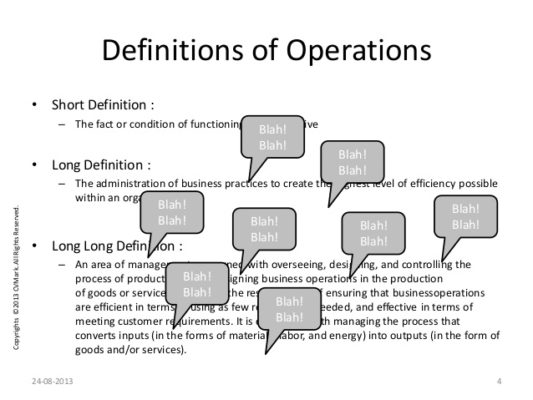Operations definition – So you want to extend your product line? Open a branch in an up-and-coming neighborhood? Resolve a purchasing inefficiency? Improve customer loyalty? Definition: Operations are the business activities that a firm engages in to convert materials into finished products or services, sell them to customers, and earn a profit. If you answered yes to any of these, or have any specific goal in mind for your business, you should look to your company’s operations – the internal engine that powers your business. Well-run operations are a critical, and often overlooked source of a business’ success.
What does operations mean?
What is the definition of operations? These procedures are used to create goods and services, market them to customers, and deliver the final products. Thus, every business’ operations are slightly different.
A manufacturer’s activities largely consist of purchasing raw materials and turning those materials into actual products. These activities include machining, milling, sandblasting, painting, and assembling materials. All of these activities add value to the product and the company overall.
Contrast that with a retailer that doesn’t create any products. It simply purchases goods from manufacturers and wholesalers and markets these goods to customers. A retailer’s operations consist mainly of logistics and marketing activities.
Most companies, like the two mentioned above, have multiple operations that are interconnected. These activities are called a process and typically consist of four parts: processing, inspecting, transporting, and storing.
Operations have the general purpose of increasing value to customers. For instance a company might obtain more business assets or improve efficiency with the use of current assets in order to reduce the production costs of its products. Thus, it can lower the price to the consumer. These procedures never cease and usually become more complex and more focused as time goes on to pinpoint areas a business can improve upon.

Let’s look at an example.
Example
Bill’s Consumer Electronics is a small manufacturer that makes and sells electronics to customers in the immediate area. Bill’s main business process looks like this:
- Processing: Bill purchases materials and parts and produces electronics.
- Inspecting: After production, the finished electronics are inspected for flaws and tested.
- Transporting: If the goods pass inspection, they are transported to retailers and Bill warehouse.
- Storing: The finished goods are stored until sold to customers.
Summary Definition
Define Operations: Operation means The actions and decisions made by participants and members of a business that affect the production, distribution, service, management, etc. needed for a company to function that requires the use of resources and assets.
What is operations definition?
Operations is the work of managing the inner workings of your business so it runs as efficiently as possible. Whether you make products, sell products, or provide services, every small business owner has to oversee the design and management of behind-the-scenes work.
The specific definition of operations will depend on your industry and the stage your business is in. Sometimes, improving operations means thinking strategically about your systems and processes. Other times, it means being part of the on-the-ground work to bring every aspect of a project, from tiny to huge, to reality.
At a small business, you may not want to dedicate a single person to an operations role. Rather, both employees and owners should understand how the business works and how various processes impact day-to-day tasks. Here are some examples of operations in different industries–and how mastering your processes can contribute to success.

-
If You’re a Retail Business
As the owner of a retail business, your daily goal is to stock the items customers want at a price they’re happy to pay.
For your operations, that means perfecting your inventory.
Take a look at records from last season. What is selling well, and what’s sitting, unwanted, on the shelves? Can you negotiate lower prices or better terms from your vendors? Would your customers be willing to pay more for any of the items you sell?
While some of the answers will be obvious when you crunch the numbers and analyze the results, another operational update might be to implement a software program that can manage and optimize your inventory in real time so you can address these questions more quickly and more often.
-
If You’re a Restaurant
Food businesses have even more challenging inventory problems than retailers, since their product is perishable. At a restaurant, operations applies not just to foodstuffs, but also purchasing, preparation, and the costs of food, beverage, and labor. You’ll also be concerned with customer service and customer experience at your restaurant.
As you look to streamline your operations, you might focus on signing contracts with important suppliers, improving the organization of your walk-in refrigerators to optimize food freshness, or training staff to exceed customer expectations. There’s a big range here, so think through who should be in charge of leading the different aspects of operations, since it likely won’t fall to one person.
-
If You’re a Service Company
Service companies can divide their operations into two key buckets: client-facing and business related.
Start by thinking through your client interactions: what could happen more quickly? Is the customer experiencing any unnecessary notifications?
Then, you’ll want to consider how your current processes for communicating, collaborating, and managing projects affect the services you’re offering. For example, if client projects are continually coming in over budget, one big operational concern would be the methods used to calculate your estimates at the beginning of a job.
-
If You Make Products
The origin of the term “operations” comes from companies that made physical goods. Back when economies were industrializing, inventive businesses tried to add efficiencies wherever possible. That led entrepreneurs like Eli Whitney to pioneer the method known as parts-based assembly, so that cotton gins and other products could come to market more rapidly, cheaply, and consistently.
You don’t have to reinvent the assembly line if your small business makes products, but you should take a good look at how you purchase, store, make, and ship your merchandise.
Consider your methods from a time standpoint: Is there a way to consolidate big orders so you can save time by working in bulk? Are there bottlenecks in your production that might have simple solutions? Could your transportation be improved upon? Could you negotiate better with your suppliers?
-
If You’re a Digital Company
Much of a digital company’s value lies in your personnel. For you, operations has a lot to do with finding optimal ways of hiring, training, and mentoring your staff. Tools to help with employee retention and satisfaction are wrapped into this, too.
With digital products, collaboration is key; most sites, apps, or tools can’t work properly without the help of multiple teams. That means that monitoring processes and updating software as needed to streamline collaboration is an operational necessity.
Another matter to pay attention to is outsourcing: what should your full-time employees spend their time on, and what types of tasks are best left to external experts?
Operations is key to running a business that’s always getting better and better at what it does. By taking a look at how your business is run and asking yourself questions about existing processes, you’ll be able to define and optimize what operations means for you and your business.
Related search with operations definition:
- What is operation management
- Operations definition
- Operation definition in business
- Different approaches to operations management
- Operation vs operations
- Operation department
- Concepts of operations management
Related post:

